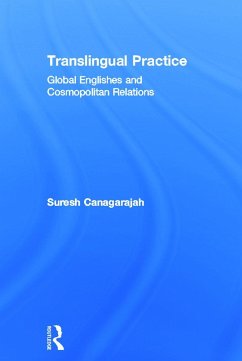Translingual Practice: Global Englishes and Cosmopolitan Relations introduces a new way of looking at the use of English within a global context. Challenging the traditional approaches in second language acquisition and English language teaching that treat the norms of native speakers as the target model for learning and emulation, this book incorporates recent advances in SLA, multilingual studies, and lingua franca English to take a new look at this area.
Hinweis: Dieser Artikel kann nur an eine deutsche Lieferadresse ausgeliefert werden.
Hinweis: Dieser Artikel kann nur an eine deutsche Lieferadresse ausgeliefert werden.
Canagarajah has done it again. Just when you may have thought it was safe to retreat to the confines of disciplinary discipline and conceptual conformity, he produces a work that necessitates a serious re-examination and re-appraisal of what language study is, or should be, about. This masterful book will be essential reading for anyone seeking answers to the question: How do we do linguistics in a globalised world?
Alan Firth, Newcastle University, UK
This is a timely and illuminating study of language use in global contact zones. In a highly innovative approach, the author goes beyond simply arguing that educators need to enable students to produce translingual texts that represent their voice but actually shows how this can be done. His book is an important contribution to the ongoing shift in sociolinguistics from a monolingual to a translingual orientation to language and communication.
Jean-Jacques Weber, University of Luxembourg
Alan Firth, Newcastle University, UK
This is a timely and illuminating study of language use in global contact zones. In a highly innovative approach, the author goes beyond simply arguing that educators need to enable students to produce translingual texts that represent their voice but actually shows how this can be done. His book is an important contribution to the ongoing shift in sociolinguistics from a monolingual to a translingual orientation to language and communication.
Jean-Jacques Weber, University of Luxembourg








